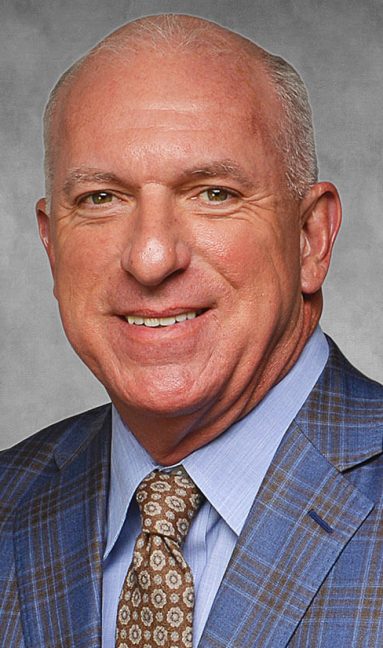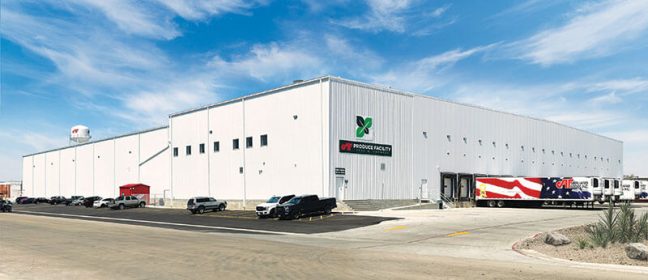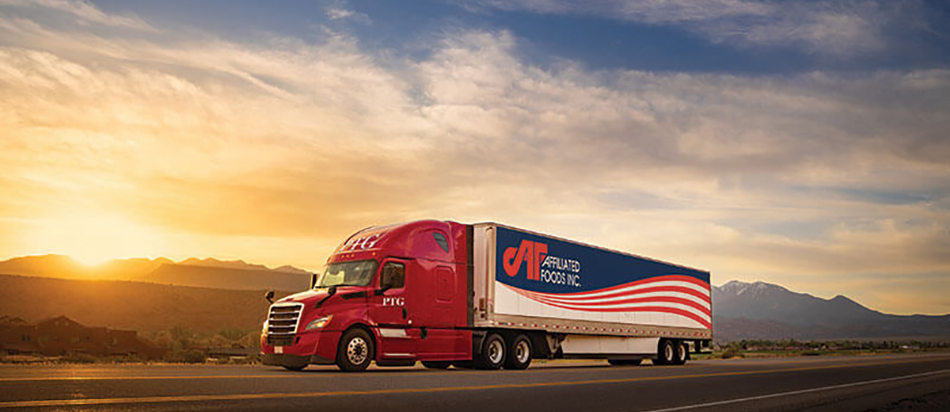In an industry defined by change, Affiliated Foods Inc. in Amarillo, Texas, has spent the last 80 years anchoring independent grocers with a simple promise: integrity, innovation and a shared sense of ownership.

This year, that legacy is honored on a larger stage. The Shelby Report of the Southwest has named AFI its Wholesaler of the Year, recognizing a cooperative that has not only endured – but evolved – without losing sight of its founding principles.
Randy Arceneaux, president and CEO, has spent nearly 16 years at the company, leading with a deep understanding of what has made the cooperative so successful since its founding in 1945.
“We have never lost focus that the members we serve actually own this warehouse, and we work for the member owners … it’s just the culture of understanding who we are and who we represent and take care of every day,” Arceneaux said.
Built for the independent
AFI began in 1945 with six independent grocers sharing a single vision: survival through collaboration. That small group now spans more than 785 stores across 10 states – Arkansas, Arizona, Colorado, Kansas, Louisiana, Nebraska, New Mexico, Oklahoma, Texas and Wyoming.
The transformation is staggering.
“Back when we started, our warehouse was very small – about 51,000 square feet,” Arceneaux said. “Now we have 1.3 million square feet under roof that we operate.”
The cooperative’s volume has grown alongside that footprint.
“This year, we’re going to finish at a little over $1.75 billion dollars in sales,” he said. “I remember looking at the first invoice that we wrote, and it was for $131. Now, our average store order is anywhere from $22,000 to $60,000, depending on store size, per delivery.”
Arceneaux also noted that in its early days, the warehouse carried about 800 items. Today, it carries more than 60,000 SKUs. “It’s a lot different.”
More than a wholesaler
What sets AFI apart isn’t just volume or reach – it’s vertical integration. The co-op owns and operates its own dairy, bakery, water plant, produce facility and meat processing operations.
Arceneaux calls them “ace cards in the deck.” And for members, they’re game-changers.
“We’re not just a grocery wholesaler that distributes food. We are producers of food as well,” he said.
“We have our own water plant, our own dairy, our own bakery, our produce operation, our own potato sheds, our own meat-processing facility, which makes it completely different than our competitors in the marketplace. And at the same time, it gives the members that we service a head start on being competitive in the market on key categories that are important to the consumer that shops their stores.”
These integrated operations help level the playing field with national chains, giving independent grocers access to quality products at competitive prices – often with a local or regional twist.
For prospective members, the idea of owning a piece of these production facilities is compelling. “You own your own dairy, bakery, meat processing facility,” Arceneaux explained. “That has a lot of merit.”
Growth with purpose
To keep pace with demand and better serve its region, AFI recently expanded both produce and dry grocery facilities.
The new produce center was a long-overdue upgrade.

“We outgrew our wet vault and our produce holding power in the main warehouse years ago,” Arceneaux said.
“We needed this for not only future growth in produce but for us to maintain the produce and the proper atmosphere that it required, especially the wet vaults. It was a project that we really had to do.”
In dry grocery, AFI introduced a vertical selection system to manage slow-moving regional items.
“You’re going to have a lot of requests or a lot of demand for different SKUs of product that are very regionalized. They may only move 10 or 15 cases a week, but they’re important to the region and we have to carry those items,” he said.
This system keeps operations lean while preserving the flexibility that small-town retailers rely on.
Measured approach to technology
While automation is sweeping the industry, AFI is holding off – for now.
“At this point, we have looked at a couple of possibilities,” Arceneaux said. “And quite honestly, when I put it on paper, I could not see the ROI for us today.”
He noted this is because AFI’s labor market remains strong, unlike many urban areas facing shortages.
“Many wholesalers and self-distributing retailers have launched automation because they could not get labor. We’re not having labor issues in Amarillo. We are fully staffed,” he said. “If we were having issues with labor, our view and approach to automation may be different. But today, we don’t have any plans to put automation in.”
Still, Arceneaux is realistic. “Ten years from now, maybe it’s a different story. But the workforce in our market is strong.”
Tools for today’s retailer
AFI hasn’t ignored modernization. Its IT department, print shop and marketing services offer full-spectrum support – from store engineering and remodeling to weekly circulars and in-store décor.
Arceneaux said the print shop is offered as a low-cost service to AFI’s members.
“We don’t look at our print shop or store décor as a profit center,” Arceneaux said. “We look at it as a break-even department so our customers can utilize it to help drive not only the customer experience when they’re shopping but also to tell their story every day in the marketplace as to why the consumer needs to shop with them.”
AFI also helps members transition to digital coupons, pricing tools and retail media platforms – many through collaborations like ROFDA’s Retail Media Network.
“Our IT department is very vibrant and works with our members very much on front-end systems and retail pricing and working with them to utilize the tools that we have in place,” Arceneaux said.
“We are definitely into the digital age. We’re moving in that direction, and we’re helping our customers go there as well.”
Independent – and unshaken
Arceneaux acknowledges the immense pressure independents face from national giants such as Walmart, Amazon, Aldi and the dollar store channel. But he’s not discouraged.
He noted that many of the stores AFI serves are in rural communities.
“They’re definitely impacted by the dollar channel in all these rural communities, and within striking distance of 20 miles, there’s probably a Walmart supercenter they compete against,” Arceneaux said.
However, he emphasized his firm belief in the power of the independent retailer.
“The independent has survived and strived in the Walmart era,” he said. “Walmart is a tough competitor, but we’re better operators than Walmart. We’ve got better produce, better meat departments; we’ve got great bakery delis and great customer service.
“And the things the independent operator has always hung their hat on, they continue to hang their hat on. That’s what brought us where we are and will continue to get us to the next phase of success in the independent world. I firmly believe that.”
Arceneaux said the No. 1 job for all wholesalers, not just Affiliated, is “to hope that the customer never loses the passion to put the key in the door. We have to help them with that by working with the vendor community, coming up with programs that compete directly with item and price but at the same time have a different twist on how we go to market.”
AFI supports those independents with tailored marketing: three-day sales, weekend events, anniversary campaigns – what Arceneaux calls “the invitation to the party every week.”
He noted that most independents take pride in providing a “great environment to shop” through clean stores, great variety and selection and competitive pricing.
“The dollar channel might give you competitive price, but that’s about it. There’s nothing else there for the consumer,” he added.
“And in the Walmart world, yes, they will have competitive price and a clean store, and they do a great job at merchandising. But then you take away the people aspect and the personal service, and what independents offer in the meat department and also your perishables that they cannot match, it continues to give us that advantage against even the big box operators.”

Vendor partnerships that last
AFI maintains strong vendor relationships through its Vendor and Retail Advisory Councils, launched 15 years ago. “We bring them together and say, ‘What do you need to drive market share?’ And as a retailer, ‘Hey, Mr. Vendor, what do you need from us in order to bring us the best cost of goods to help us compete in the marketplace?’” Arceneaux said.
“That marriage between vendor and retailer has been super successful for us because they’re all on the same page, working together to understand each other’s needs. They all work toward the common goal of selling groceries to the consumer in the markets we serve. What we did with that marriage 15 years ago has paid dividends to our membership and to the vendor community time and time again.”
Culture rooted in family
At the heart of AFI’s success is its cooperative spirit and deep-seated culture.
“When you’re a cooperative, in my opinion, your culture has to be family focused, because at the end of the day we’re families feeding families, feeding families,” Arceneaux said.
It is everyone working together – “families working with families,” he said. “And we always talk about the Affiliated family, and it’s not just a cliché here. We believe that wholeheartedly.
“When we welcome a new member to the Affiliated family, it’s a true family of retailers, wholesale people and the vendor community all working together to accomplish that same goal. Our culture starts with family and understanding that all of us are part of the bigger picture, and that’s feeding the families in all these different communities that we service.”
Arceneaux said AFI’s commitment is to stay true to its vision and its morals. “For 80 years, we have hung our hat on servicing the independent with honesty, integrity and transparency. And 80 years later, we’re still doing that. We haven’t changed that.”
Co-op in name, spirit
At its core, AFI is still a cooperative. One member, one vote. One price for all.
A cornerstone of Affiliated Foods’ approach is its pricing structure, which ensures fairness across its diverse membership base.
“Everybody pays the same cost of goods from here, whether you own one store or several – it doesn’t matter. We sell one price to all our members,” Arceneaux explained.
This philosophy ensures that even the smallest store in the most rural area has the same competitive footing as larger operators.
“Everybody has to remember Affiliated Foods started with single-store operators,” Arceneaux said. “And that single-store operator has to be competitive in the market, just as the guy with several has to be competitive throughout his markets. It’s all the same.”
The principle of equality extends beyond pricing to governance.
“Nobody has more voting rights in our company. If you own multiple stores, you’ve got one voting right. If you own one store, you have one voting right in the co-op. Everybody’s treated equally,” he said. “And we go to work for that one store operator as hard as the guy that owns several locations, every single day.”
Looking ahead
As AFI celebrates 80 years, its focus remains clear: stay true to its mission, support its members and keep growing – organically and strategically.
“I tell my board this all the time – we always have to remember to keep the main thing, the main thing. And the main thing in our world is to be what I believe to be the best grocery cooperative in the country.”
AFI will continue to grow with its members and selectively expand its base. But its core values – honesty, integrity and transparency – remain non-negotiable.
“As long as we keep our focus on understanding what our true cause every day is as a cooperative, never take our eyes off of the main thing and what we really are here to do every day, then I see Affiliated Foods just continue to thrive and grow long after Randy’s retired,” Arceneaux said.


I HAVE CALLED ON AFF FOR RUFLY 30 YEARS, THE THINGS THEY HAVE ACCOMPLISHED IN THIS TIME IS AMAZING, RANDY HAS DONE A GREAT JOB OF MOVING THE COMPANY FORWARD TO BE ABLE TO COMPETE WITH THE BIG CHAINS, TOP QUALITY MEAT, PRODUCE AND SERVICE IS SECOND TO NONE. CONGRATULATIONS FOR A JOB WELL DONE.